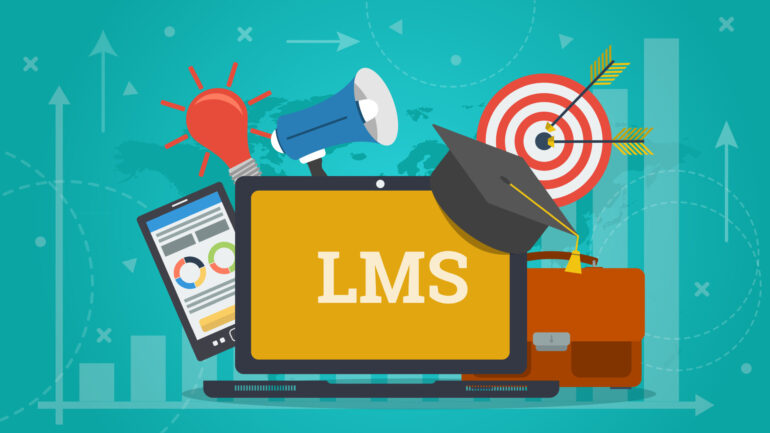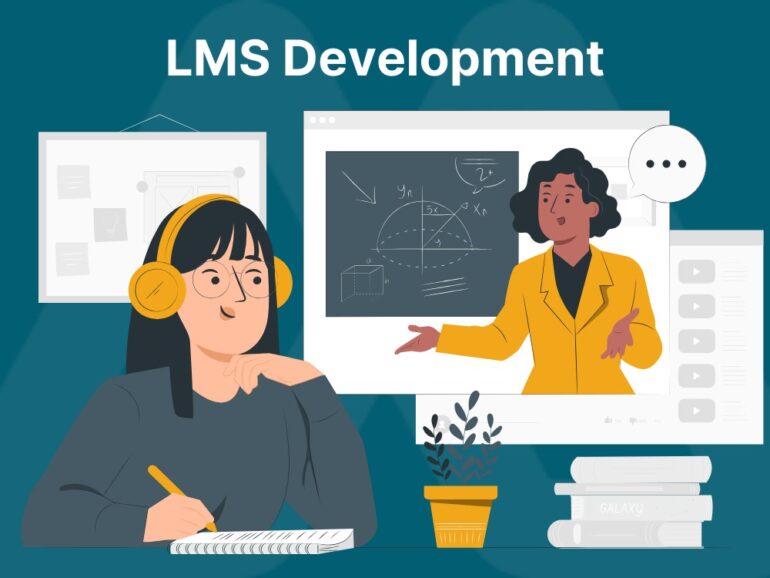In the fast-paced world of business, staying ahead of the curve is paramount. One of the key drivers of success in today’s competitive landscape is the ability to continuously upskill and develop employees. A well-trained workforce not only enhances productivity and operational efficiency but also fosters innovation and adaptability – essential ingredients for long-term growth and sustainability.
To meet this critical need, organizations across industries have embraced Learning Management Systems (LMS) as a powerful tool for delivering training programs and educational content. However, as businesses evolve and their training needs become increasingly complex, off-the-shelf LMS solutions often fall short, failing to address the unique requirements and nuances of individual organizations.
This is where custom LMS development emerges as a game-changer, offering a tailored solution that aligns perfectly with an organization’s specific goals, workflows, and learning methodologies.
Understanding Custom LMS Development

Custom LMS development refers to the process of designing and building a learning management system from the ground up, meticulously crafted to meet the unique needs and objectives of an organization. Unlike pre-packaged solutions, a custom LMS is a bespoke platform that incorporates an organization’s branding, compliance requirements, existing systems, and preferred learning approaches.
By opting for custom LMS development, organizations gain complete control over the platform’s functionality, user experience, and integration capabilities. This level of customization ensures that the LMS seamlessly blends into existing systems and processes, minimizing disruptions and maximizing operational efficiency.
The Power of Customization
One of the primary advantages of custom LMS development is the ability to tailor the platform to an organization’s specific needs. Every business is unique, with distinct learning objectives, target audiences, and operational requirements. A custom LMS allows organizations to design a solution that precisely meets these needs, without the compromises often associated with off-the-shelf solutions.
Seamless Integration: A Key Benefit

In today’s interconnected business environment, the ability to integrate various systems and platforms is crucial for optimal efficiency and data consistency. Custom LMS development ensures that the learning management system can seamlessly integrate with existing systems, such as HR databases, performance management tools, and enterprise resource planning (ERP) software.
This LMS integration streamlines data exchange, automates processes, and eliminates redundant data entry, ultimately improving operational efficiency and reducing the risk of errors. By seamlessly integrating with existing systems, a custom LMS becomes a central hub for learning and development, providing a comprehensive view of employee training, performance, and progress.
Scalability and Future-Proofing
As businesses grow and evolve, their training and development needs inevitably change. A custom LMS can be designed with scalability in mind, allowing for easy expansion and adaptation as the organization’s requirements shift over time. This future-proofing ensures that the LMS remains a valuable asset, capable of supporting the organization’s long-term growth and development goals.
Furthermore, custom LMS development allows for the integration of cutting-edge technologies and learning methodologies as they emerge, ensuring that the platform remains relevant and effective in an ever-changing landscape.
Enhancing the User Experience
User experience is a critical factor in the success of any learning management system. A custom LMS development approach enables organizations to tailor the platform’s user interface and navigation to align with their corporate branding and user preferences. This enhanced user experience can significantly increase engagement, motivation, and overall satisfaction with the learning process.
Additionally, a custom LMS can incorporate personalized learning paths, adaptive assessments, and interactive multimedia content, creating a more immersive and effective learning experience for employees.
Robust Security and Compliance
Depending on the industry and geographical location, organizations may be subject to various regulatory requirements and compliance standards. Custom LMS development allows for the integration of robust security measures and compliance features tailored to the organization’s specific needs, ensuring data privacy, intellectual property protection, and adherence to industry-specific regulations.
This level of security and compliance not only protects the organization from potential legal and financial risks but also instills confidence in employees and stakeholders, fostering a culture of trust and transparency.
The Custom LMS Development Process

While the specifics may vary depending on the organization’s requirements and the development team’s approach, the custom LMS development process typically follows a structured methodology. Here’s a high-level overview of the key stages:
- Requirements Gathering and Analysis
The first step is to thoroughly understand the organization’s learning and development goals, target audience characteristics, existing systems and processes, and any specific compliance or regulatory requirements. This information forms the foundation for the LMS design and development. - Design and Prototyping
Based on the gathered requirements, the development team creates wireframes, mockups, and prototypes to visualize the LMS’s user interface, navigation, and functionality. This iterative process allows for stakeholder feedback and refinement before moving to the development phase. - Development and Integration
The core LMS platform is developed, incorporating the agreed-upon features, functionality, and user experience elements. Simultaneously, the LMS integration with existing systems and platforms is implemented, ensuring seamless data exchange and process automation. - Testing and Quality Assurance
Rigorous testing is conducted to identify and address any bugs, usability issues, or performance bottlenecks. This stage ensures that the custom LMS meets the organization’s requirements and delivers a smooth, reliable user experience. - Deployment and Training
Once the LMS has been thoroughly tested and validated, it is deployed to the production environment. End-user training sessions are conducted to ensure a smooth transition and to maximize the adoption and utilization of the new platform. - Ongoing Support and Maintenance
Custom LMS development is an iterative process, with ongoing support and maintenance to address emerging needs, implement updates and enhancements, and ensure the platform remains aligned with the organization’s evolving requirements.
Partnering with the Right Custom LMS Development Team

While the benefits of custom LMS development are numerous, the success of the project hinges on partnering with the right development team. Experienced custom LMS developers bring a wealth of expertise in instructional design, user experience, and technical proficiency to the table.
When evaluating potential partners, consider their track record, industry experience, and ability to understand and translate your organization’s unique requirements into a tailored learning solution. Communication, transparency, and a collaborative approach are also essential for a successful custom LMS development project.
Conclusion
In an era where knowledge and skill development are the cornerstones of organizational success, investing in a robust and tailored learning management system is no longer an option but a strategic imperative. Custom LMS development offers organizations a powerful solution to deliver targeted, engaging, and effective learning experiences that align seamlessly with their unique needs, workflows, and compliance requirements.
By leveraging the expertise of experienced custom LMS development teams, organizations can create a platform that fosters continuous learning, drives workforce productivity, and cultivates a culture of innovation and growth. With the power of custom LMS development, businesses can unlock the full potential of their employees, gaining a competitive edge in an ever-changing and increasingly knowledge-driven business landscape.
